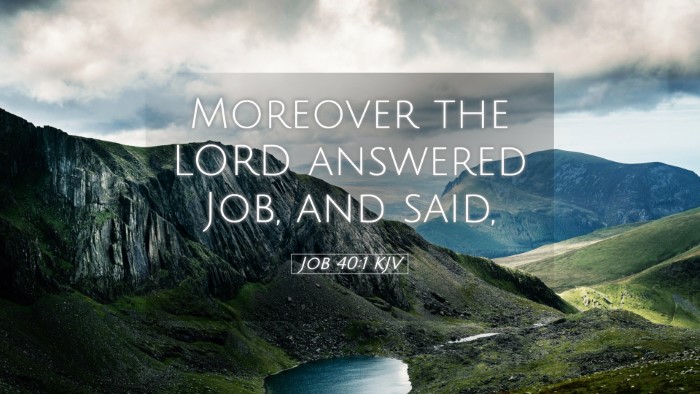Old Testament
Genesis Exodus Leviticus Numbers Deuteronomy Joshua Judges Ruth 1 Samuel 2 Samuel 1 Kings 2 Kings 1 Chronicles 2 Chronicles Ezra Nehemiah Esther Job Psalms Proverbs Ecclesiastes Song of Solomon Isaiah Jeremiah Lamentations Ezekiel Daniel Hosea Joel Amos Obadiah Jonah Micah Nahum Habakkuk Zephaniah Haggai Zechariah MalachiJob 40:1
Job 40:1 KJV
Moreover the LORD answered Job, and said,
Job 40:1 Bible Commentary
Commentary on Job 40:1
Introductory Context: The Book of Job stands as a profound exploration of suffering, faith, and the sovereignty of God. Job 40:1 marks a pivotal moment where God responds to Job's lamentations and challenges faced during his trials. This commentary seeks to delve into the insights offered by esteemed biblical scholars including Matthew Henry, Albert Barnes, and Adam Clarke.
Text of Job 40:1
"Moreover the LORD answered Job, and said,"
The Nature of God's Response
The verse begins with a simple phrase: "Moreover the LORD answered Job." This signifies the culmination of Job's inquiries and lamentations directed toward God. The significance of God’s discourse cannot be understated. It indicates not only divine acknowledgment of Job's plight but also the necessity of divine wisdom in the discourse surrounding human suffering.
Insights from Scholars
-
Matthew Henry:
Henry emphasizes that God’s answer is not a direct resolution to Job’s questions but rather an invitation for Job to recognize his own limitations in understanding the divine purposes. He states, “God does not speak to the man who has put in a plea, but to the man who knows nothing to say.” This highlights the necessity of humility in the face of the overwhelming grandeur of God’s creation and wisdom.
-
Albert Barnes:
Barnes notes that the response of God is meant to provoke thought rather than provide simple answers. The phrase "Moreover the LORD answered" suggests that God is stepping in to redirect Job’s focus from his suffering to the majesty and sovereignty of the Creator. He indicates that this is not merely a rebuttal but a teaching moment designed to elevate Job's understanding of God’s omnipotence.
-
Adam Clarke:
Clarke remarks on the spiritual gravity of God’s engagement with Job. He declares that God’s communication is not only profound but serves to draw Job into a deeper relationship with His Creator. Clarke elucidates that the word “answered” suggests a dialogue; it is an invitation for Job to engage with God in a way that transcends mere complaint and enters into a realm of worship and awe.
Theological Implications
A central theme in the discourse is God's sovereignty over creation. The dialogue that begins in Job 40 extends into a series of rhetorical questions that underscore God's control over the universe. Job is invited to reflect on creation itself—a fundamental theme in biblical wisdom literature.
Job 40:1 serves as a prelude to further revelations of the Creator’s majesty, reminding pastoral leaders and theologians that in the face of suffering, it is essential to acknowledge God’s omniscience and sovereignty which might be beyond human comprehension.
Relevance in Pastoral Ministry
-
Pastoral Care:
This passage challenges pastors to help congregants see beyond their immediate suffering. It stresses the importance of guiding individuals to a deeper understanding of God’s nature and His ability to work within and through suffering to bring about greater faith and reliance on Him.
-
Understanding Suffering:
Job's story encourages students and theologians to explore the complex issue of why the righteous suffer. This passage underlines that God's ways are not always understandable, but they always serve a purpose within the grand narrative of redemption.
Conclusion
Job 40:1 is a concise yet profound verse that serves as a preamble to the incredible revelations about the nature of God in the subsequent verses. The commentaries from Matthew Henry, Albert Barnes, and Adam Clarke collectively inform readers that God's response to Job is an indication of divine majesty and an invitation for deeper reflection on His nature. The study of this verse not only enriches one’s theological understanding but also equips pastors and theologians to better articulate the complexities of faith amidst suffering.


